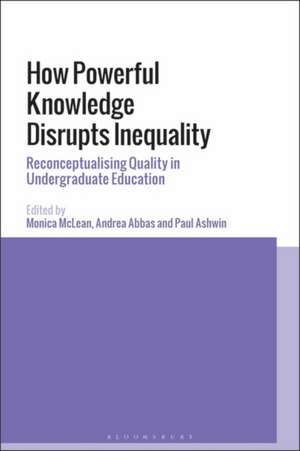How Powerful Knowledge Disrupts Inequality: Reconceptualising Quality in Undergraduate Education
Autor Dr Monica McLean, Andrea Abbas, Dr Paul Ashwinen Limba Engleză Paperback – 26 iun 2019
Preț: 231.51 lei
Preț vechi: 265.43 lei
-13% Nou
Puncte Express: 347
Preț estimativ în valută:
44.31€ • 48.15$ • 37.25£
44.31€ • 48.15$ • 37.25£
Carte tipărită la comandă
Livrare economică 21 aprilie-05 mai
Preluare comenzi: 021 569.72.76
Specificații
ISBN-13: 9781350127098
ISBN-10: 1350127094
Pagini: 272
Dimensiuni: 156 x 234 mm
Greutate: 0.38 kg
Editura: Bloomsbury Publishing
Colecția Bloomsbury Academic
Locul publicării:London, United Kingdom
ISBN-10: 1350127094
Pagini: 272
Dimensiuni: 156 x 234 mm
Greutate: 0.38 kg
Editura: Bloomsbury Publishing
Colecția Bloomsbury Academic
Locul publicării:London, United Kingdom
Caracteristici
Draws on the 'Quality and Inequality in University First Degrees' project (2008-2012), funded by the UK-based Economic and Social Research Council (ESRC)
Notă biografică
Monica McLean is Professor of Higher Education in the School of Education at the University of Nottingham, UK. She has written Pedagogy and the University and Professional Education, Capabilities and the Public Good.Andrea Abbas is Senior Lecturer (Associate Professor) in Education at the Department of Education, University of Bath, UK.Paul Ashwin is Professor of Higher Education in the Department of Educational Research at Lancaster University, UK. He is the lead author of Reflective Teaching in Higher Education.
Cuprins
Part I: Introduction1. University Education, Inequality and Knowledge 2. Introducing the Four Universities and Departments Part II: Setting the Scene3. The Patterning of Inequality in Higher Education 4. The Construction of High- Quality University Education 5. The Power of Sociology- Related Knowledge Part III: Exploring Educational Quality6. Comparing Sociology- Related Curricula: Th e Pedagogic Device 7. Pedagogy for Powerful Knowledge and UnderstandingPart IV: The Powerful Equalizing Effects of Knowledge8. Disciplinary Identity and Pedagogic Rights 9. Undergraduate Education and Future Lives Part V: Conclusion10. Socially Just University Curriculum and Pedagogy Appendix 1: Research Methodology Appendix 2: Curricula: Compulsions and Choices References Index
Recenzii
This book makes an important contribution to thinking about 'quality' ... Its strength is in the cumulative power of both its theoretical and empirical arguments ... I always felt I was contributing to transforming students' lives and was proud of what we did but this book gives the intellectual arguments for why quality is found in places where the neo-liberal gaze does not expect it. A most impressive accomplishment - it deserves a wide readership.
A lively and engaging book about the importance of sociology as a subject in undergraduate students' lives and how it might empower such students' futures. It neatly uses Bernsteinian perspectives to enrich the argument about continuing inequalities and qualities in higher education and society.
An important and grounded critique of the simplistic notion that quality is related primarily to university status. The study offers encouraging findings on how, across four very different university contexts, young people experienced higher education as profoundly transformative. Notably, the authors' analysis is able to identify the kinds of curricular and pedagogical arrangements that are making the greatest impact in terms of ameliorating social inequities in students' background.
A lively and engaging book about the importance of sociology as a subject in undergraduate students' lives and how it might empower such students' futures. It neatly uses Bernsteinian perspectives to enrich the argument about continuing inequalities and qualities in higher education and society.
An important and grounded critique of the simplistic notion that quality is related primarily to university status. The study offers encouraging findings on how, across four very different university contexts, young people experienced higher education as profoundly transformative. Notably, the authors' analysis is able to identify the kinds of curricular and pedagogical arrangements that are making the greatest impact in terms of ameliorating social inequities in students' background.
